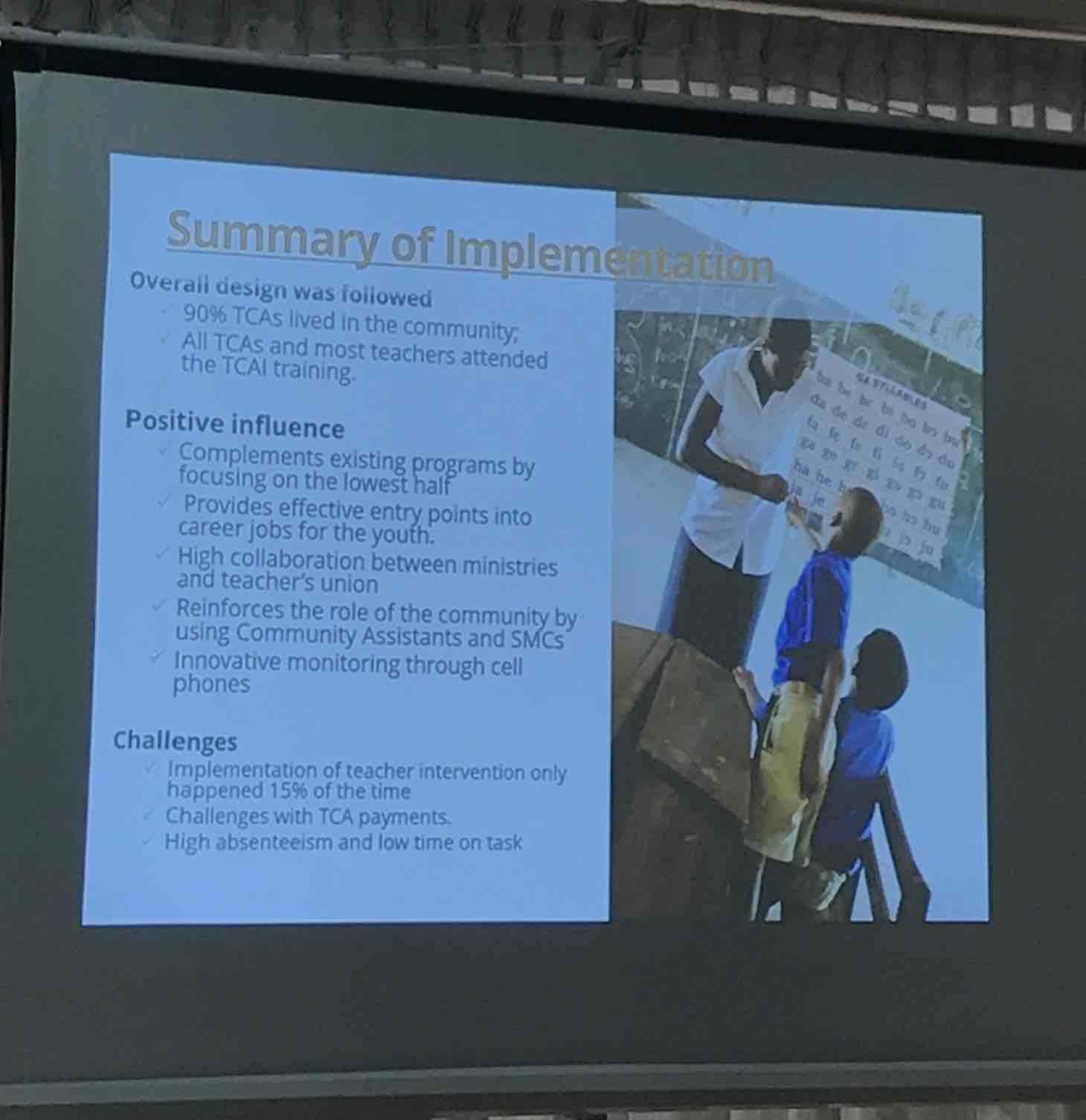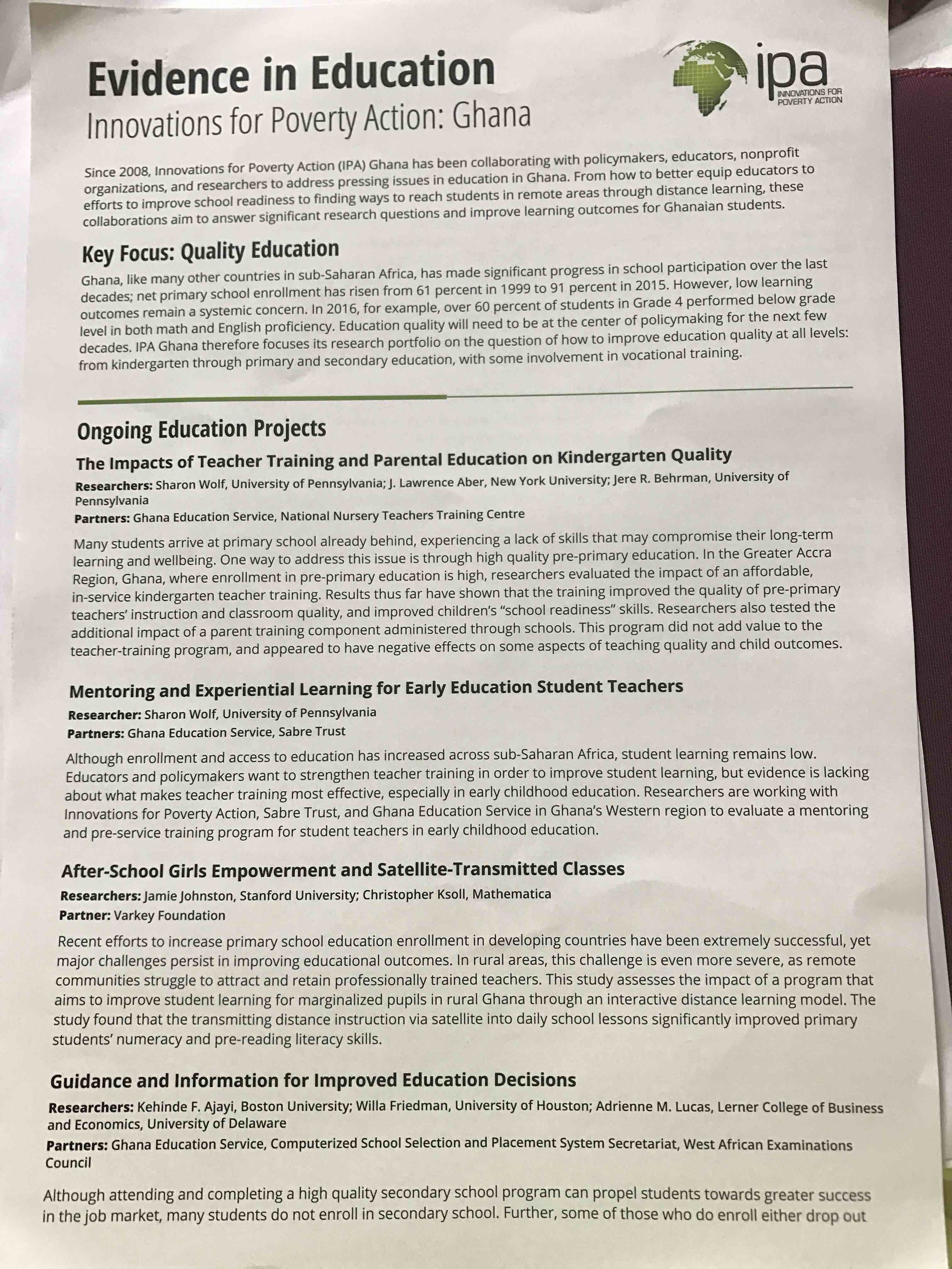By Grace Kelly, Semester at Sea, Spring 2017
When one makes a monetary donation to a developing country, helps build a school, or joins an organization like Teach for America, it’s done with the intention that these actions are helping to improve the situations in developing countries. But are they really making an impact?
Innovations for Poverty Action, an American non-profit research organization with 51 locations worldwide, seeks to address that question. IPA’s location in Ghana is one of the largest in the world, and I was lucky enough to meet one of IPA’s Research Coordinators, Kym Cole (who is a Semester at Sea alum!), as part of my Economic Development field class.
Using randomized control trials (RCTs) to eliminate bias, IPA measures the impact of development policy in a variety of sectors: education, healthcare, agriculture, and microfinance to name a few. RCTs are a lengthy, painstaking process, requiring months and sometimes years of research.
Ghana has a literacy rate of 71% and schools struggle with student and teacher absenteeism, lack of teaching aides, lack of teacher time spent on task, and large classrooms (around 50 students to 1 teacher). Kym showed us an example of a recent research project to determine the effectiveness of a variety of initiatives to improve education outcomes. They had one control group where no intervention was used and four other groups that received interventions: remedial education during school hours, remedial education after school hours, splitting up the classes for more focused review, and training the teachers in better techniques.
IPA measured their results through oral and written tests and surveys that were distributed amongst teachers, parents, students, and the local community. The results showed a non-improving situation for the control group, with scores actually getting lower in some cases, a concerning finding. The positive effects of all four interventions was driven mostly by improvements in literacy, with remedial after-school classes being the most effective. However, the research found that there were no significant impacts on teacher on-task time or absenteeism from these policies. This suggests that supervision or systemic changes need to still occur. After having discussed the role of education in economic development throughout the semester, it was fascinating to see its tangible impacts in the real world. Have you ever tried to make an impact in another country, and if so, do you think it actually made a positive difference?
By Grace Kelly, Semester at Sea, Spring 2017
When one makes a monetary donation to a developing country, helps build a school, or joins an organization like Teach for America, it’s done with the intention that these actions are helping to improve the situations in developing countries. But are they really making an impact?
Innovations for Poverty Action, an American non-profit research organization with 51 locations worldwide, seeks to address that question. IPA’s location in Ghana is one of the largest in the world, and I was lucky enough to meet one of IPA’s Research Coordinators, Kym Cole (who is a Semester at Sea alum!), as part of my Economic Development field class.
Using randomized control trials (RCTs) to eliminate bias, IPA measures the impact of development policy in a variety of sectors: education, healthcare, agriculture, and microfinance to name a few. RCTs are a lengthy, painstaking process, requiring months and sometimes years of research.
Ghana has a literacy rate of 71% and schools struggle with student and teacher absenteeism, lack of teaching aides, lack of teacher time spent on task, and large classrooms (around 50 students to 1 teacher). Kym showed us an example of a recent research project to determine the effectiveness of a variety of initiatives to improve education outcomes. They had one control group where no intervention was used and four other groups that received interventions: remedial education during school hours, remedial education after school hours, splitting up the classes for more focused review, and training the teachers in better techniques.
IPA measured their results through oral and written tests and surveys that were distributed amongst teachers, parents, students, and the local community. The results showed a non-improving situation for the control group, with scores actually getting lower in some cases, a concerning finding. The positive effects of all four interventions was driven mostly by improvements in literacy, with remedial after-school classes being the most effective. However, the research found that there were no significant impacts on teacher on-task time or absenteeism from these policies. This suggests that supervision or systemic changes need to still occur. After having discussed the role of education in economic development throughout the semester, it was fascinating to see its tangible impacts in the real world. Have you ever tried to make an impact in another country, and if so, do you think it actually made a positive difference?



